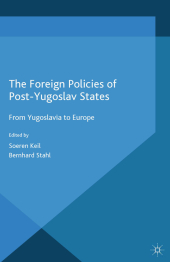 Neuerscheinungen 2014Stand: 2020-02-01 |
Schnellsuche
ISBN/Stichwort/Autor
|
Herderstraße 10
10625 Berlin
Tel.: 030 315 714 16
Fax 030 315 714 14
info@buchspektrum.de |

S. Keil, B. Stahl
(Beteiligte)
The Foreign Policies of Post-Yugoslav States
From Yugoslavia to Europe
Herausgegeben von Keil, S.; Stahl, B.
1st ed. 2014. 2014. xvii, 259 S. 216 mm
Verlag/Jahr: SPRINGER PALGRAVE MACMILLAN; PALGRAVE MACMILLAN UK 2014
ISBN: 1-349-48084-3 (1349480843)
Neue ISBN: 978-1-349-48084-5 (9781349480845)
Preis und Lieferzeit: Bitte klicken
The post-Yugoslav states have developed very differently since Yugoslavia dissolved in the early 1990s. This book analyzes the foreign policies of the post-Yugoslav states, thereby focusing on the main goals, actors, decision-making processes and influences on the foreign policies of these countries.
PART I: POINT OF DEPARTURE 1. Introduction: The Foreign Policies of the post-Yugoslav States; Soeren Keil and Bernhard Stahl 2. Allies are Forever (until they are no more): Yugoslavia´s Multivectoral Foreign Policy during Titoism; Katrin Boeckh PART II: EARLY DEPARTURE - EARLY ARRIVAL 3. From the Balkans to Central Europe and Back: The Foreign Policy of Slovenia; Ana Bojinovi? Fenko und Zlatko Sabi? 4. Croatia fast-forward Foreign Policy: From Yugoslavia to the EU Senada Selo Sabi? PART III: EARLY DEPARTURE - LATE ARRIVAL 5. Policy Consensus during Institutional Change: Macedonian Foreign Policy since Independence; Cvete Koneska 6. Complex System, Complex Foreign Policy: The Foreign Policy of Bosnia and Herzegovina; Adnan Huski? PART IV: JOINT DEPARTURE - DIFFERENT ARRIVALS 7. An Orpheus Syndrome? Serbian Foreign Policy after the Dissolution of Yugoslavia; Mladen Mladenov 8. From Creeping to Sprinting: The Foreign Policy of Montenegro; Jelena Dzanki? 9. Foreign Policy as a Constitutive Element of Statehood and Statehood Prerogative: The Case of Kosovo ; G‰zim Krasniqi 10. Conclusion: Foreign Policy Analysis and the post-Yugoslav State; Amelia Hadfield
"This book provides a thorough and in-depth analysis of the foreign policies of the seven countries that emerged from the dissolution of Yugoslavia. ... the book is a highly recommended contribution. It is a must-read for scholars and researchers working on EU enlargement and on the foreign policies of post-Yugoslav states." (Stella Georgiadou, Europe-Asia Studies, Vol. 67 (8), October, 2015)
Katrin Boeckh, Institute for East and Southeast European Studies Regensbur, Germany and the Ludwig-Maximilians-University of Munich, Germany Ana Bojinovi?-Fenko, University of Ljubljana, Slovenia Jelena D anki?, European University Institute, Italy Amelia Hadfield, PhD, Canterbury Christ Church University, UK Adnan Huski?, University of Graz, Austria and Sarajevo School of Science and Technology, Bosnia and Herzegovina. Cvete Koneska, Control Risks Group, UK G‰zim Krasniqi, University of Edinburgh, UK Zlatko abi?, University of Ljubljana, Slovenia Senada elo abi?, Institute for Development and International Relations, Croatia


